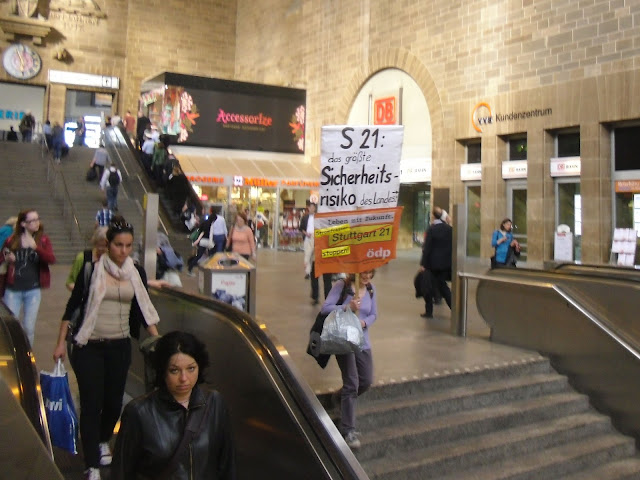I finally stumbled upon a group of Japanese tourists today, so I immediately decided to follow them and see how they made their way around the city.
It was not so spectacularly different from the other groups I've seen, to be perfectly honest. They stopped at the historical points of interest where their guide, a Japanese woman, talked about the site while they took some pictures. They were 50+ in age and spent maybe 4 or 5 minutes at each spot at most. They finally made their way to their coach, parked at Karlsplatz, and drove off. The only fun thing about watching them, in fact, was managing to follow their group and take a few pictures, without being spotted.
When the Japanese group drove off, a British coach rolled up in their place; a Shearing's Grand Tourer with a sign on the front window, Beautiful Bavaria All Inclusive. The Brits filed out, lit cigarettes and milled about. They didn't get a guided tour, for them Stuttgart was a cigarette break and 40-minute shopping opportunity on their way home from Munich. Checking Shearing's schedule, the only time they come to Stuttgart as a destination in itself is in Winter for the Christmas Markets Tour.
I then followed a quite different tour: the gay tour of Stuttgart. I extrapolated this this from a website that shows the Homo Map of the city. I never thought it would be so easy to find this route but then I realised that the gay community is maybe a bit ahead of the game in being conscious of itself as a community, and this makes it easier for gay visitors to enter.
I started with the gay bookshop and then went to the gay friendly cafe, which just looked like any other cafe. I then started to imagine that this was the itinerary of a real person who had arrived in the city and having first dropped into the bookstore, had a coffee in the cafe and was starting to think of the evening's distractions.
Next stop Kings Club, Stuttgart's oldest gay and lesbian nightclub, 35 year and still going strong. But lets say it was not a good evening there.
So round the corner to Blue Box which says it is "more than a cinema". With rooms to rent by the hour I should imagine it certainly is.
Finally our weary gay traveller finishes at the Steigenberger Graf Zeppelin, a good-quality gay friendly hotel opposite the station. While it seemed odd to make this tour in a documentary manner, I rather suspect that some people have genuinely been on a similar tour.
finding myself beside the rail station I wanted to check out the anti-S21 protests that are a regular Monday affair. This week I saw more police than protesters. Just a few die hards with placards like this lady. I think most other people have more or less resigned themselves to it happening.
Finally I noticed something interesting in the station itself. It was a traditional clothing stall. I resisted the temptation to rush over to it and buy Lederhosen and instead noticed how Cannstatter Volksfest (second only to the Oktoberfest as a popular German festival) was represented on the top of the stall through its logo. I have been wondering how can I talk about all these things that are not actually in the city-centre but which are nonetheless important. I realised that these representations of the sites in the suburbs could prove very useful. Indeed, for similar reasons to those I face, representing the scattered attractions of Stuttgart, the city seems to have a lot of pictures and logos of its sites displayed in various places that are used in lieu of the sites themselves. The tour bus, for example, has photos of its main destinations printed large on the side of the bus and the TV tower is replicated widely too. This says something about the efforts of the city to commodify itself, which is quite definitely one part of what I see, though far from the whole story.









No comments:
Post a Comment